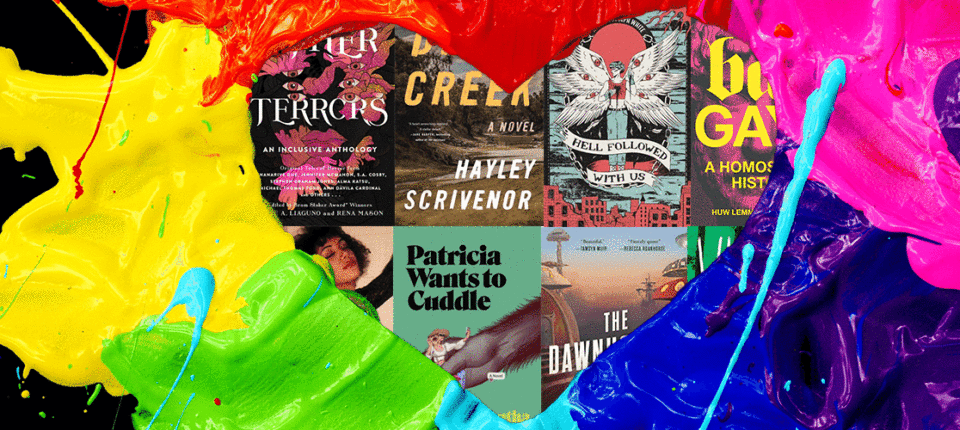While last year was the year of great gay thrillers, this year brings something wholly unexpected: the rise of queer rural noir, blending well into the folk horror revival (it’s an aesthetic). This year also brings many works from trans authors who are using the tropes of psychological thrillers and horror fiction to explore the meaning of otherness and reclaim space at the center of the narrative. Finally, 2022’s collection of queer crime fiction is defined by a need for complexity over heroism, as we examine modern power structures and their space in relationships and desire.
You can find last year’s roundup of all-new books for Pride Month here. Below, you’ll find a list of 24 books coming out in 2022 featuring queer themes or by LGBTQ authors, arranged by publication date.

Robyn Gigl,Survivor’s Guilt
(Kensington, January 25)
In this followup to Robyn Gigl’s incredible debut, By Way of Sorrow, a millionaire businessman has been killed and his daughter accused of the crime. Erin McCabe, Gigl’s crusading lawyer heroine, gets reluctantly involved with the case and soon finds out that the story behind the oligarch’s death is much more sordid and heart-breaking than she could have ever imagined. Another great merger of legal mystery and psychological thriller.

Gretchen Felker-Martin, Manhunt
(Tor Nightfire, February 22)
I dub this the great Terf-pocalypse novel. A found family must navigate complex dynamics between themselves, also while killing a whole lot of feral men and TERFs. In a dystopian scenario where a plague attacks testosterone levels, trans women are able to successfully keep the disease at bay by hunting the now feral men and eating their balls, as well as processing various plants for estrogen. Meanwhile, the TERFs are spreading hate against trans women by warning of the dangers of what happens when testosterone gets high enough to activate the plague, despite so many successfully fending it off. Oh, and a rich girl in a bunker does some really weird shit. I cannot underscore enough how much I love this novel.
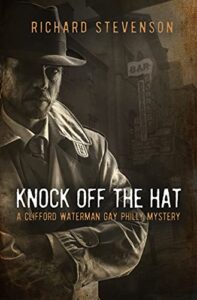
Richard Stevenson, Knock off the Hat
(Bywater Books, April 26)
Dick Lipez, who wrote under the pen of Richard Stevenson, died earlier this year after many decades of writing and living life to the fullest. Rather than saying something myself, I’ll let Michael Nava’s words guide you towards his works:
In classical noir, the homosexual—think Joel Cairo in The Maltese Falcon or A.C. Geiger in The Big Sleep—was a marginal character and the subject of ridicule and contempt…Dick [Lipez] claimed he created [his detective Don] Strachey because he wanted to present a gay man as contented and not tortured…[Strachey] departs from the traditional noir PI in that he is emotionally well-adjusted, relatively sober, has a loving companion and foil in Timmy Callahan and is part of a vibrant community, Albany’s gay community.
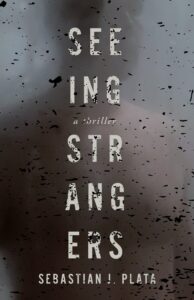
Sebastian J. Plata, Seeing Strangers
(Agora, May 3)
I loved Briana Schaefer’s Couples Wanted and now I’m excited to announce that there is another open marriage thriller coming out! In Seeing Strangers, the happily married Greg and Cristian have been together for 11 years and open for 4 when they decide to take the next step in their relationship and embrace fatherhood. The child’s arrival is meant to be the end of their open relationship—who has time to date around with a baby?—but when Greg’s ex shows up and starts stalking him, Greg and Cristian’s marriage begins to fall apart and Greg faces an increasingly stark dilemma.
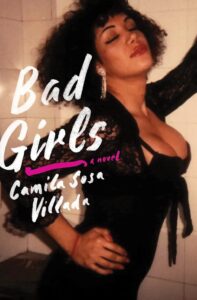
Camila Sosa Villada, Bad Girls
Translated by Kit Maude
(Other Press, May 10)
Like Fiona Mosley’s Hot Stew, Bad Girls is more of a book about found family and societal othering than a book about sex workers (because sex workers are people and have all the complexities of ordinary lives, ok). Camila Sosa Villada has written a beautiful, queer, magical tale of trans sex workers who find a baby and decide to raise the child together under the advice of their nearly 200-year-old leader. Perfect for those who enjoy dark fantasy, queer fiction, and communal living.

Massoud Hayoun, Building 46
(Darf Publications, May 17)
In this ode to the mysteries of travel and exploration, a young student in China becomes obsessed with a seemingly ordinary building with an extraordinarily haunted past. You can read an excerpt from Building 46 here.
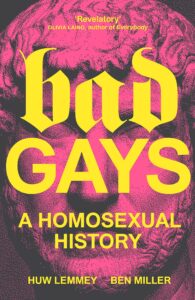
Huw Lemmey and Ben Miller, Bad Gays: A Homosexual History
(Verso, May 31)
Bad Gays reflects a turn towards more complicated queer stories, in fiction and nonfiction, as representation moves beyond the heroic towards something more realistic and interesting. In this delightfully entertaining book based on the hilarious hit podcast, Huw Lemmey and Ben Miller tell the stories of some of the most villainous queer characters in history, who are, of course, bad because of their place in ancient hierarchies and modern capitalism, and not because of their sexualities.
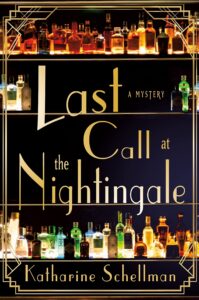
Katharine Schellman, Last Call At the Nightingale
(Minotaur, June 7)
It’s 2022, baby, so why not read a queer mystery set in the swinging speakeasies of the jazz age? 100 years ago, tough-talking dames swilled sugary rotgut while flirting with each other, wild music accompanying their daring deeds, and occasionally, one must assume, these women took it upon themselves to solve some crimes. As for Last Call at the Nightingale, well, what happens when a body’s discovered behind your favorite club? You’d better track down the culprit, or you’ll have to find a new place to drink!
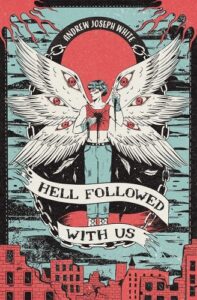
Andrew Joseph White, Hell Followed Us
(Peachtree Teen, June 7)
Body horror meets apocalypse noir meets queer love story in Andrew Joseph White’s viscera-filled YA novel, Hell Followed With Us, perfect for those who appreciated Manhunt earlier this year but wished it came with more intestines. In White’s debut, trans boy Benji is on the run from his fundamentalist mother and her apocalyptic cult when he finds shelter with the kind denizens of a LGBTQ Center, and budding romance with the mysterious and deadly Nick. He’d love to just be happy with his new friends, but his old community is in hot pursuit—they’ve injected him with a transformative virus that gives him control over the many monsters created by a deadly plague, and they’re not about to let him go. In order to escape for good, Benji must embrace his terrible new powers in a perfect metaphor for coming-of-age that is also a disgusting pile of blood and viscera (and I mean that in the best possible way).
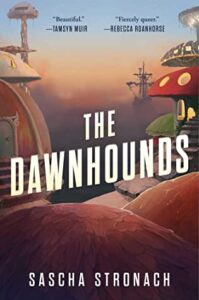
Sascha Stronach, The Dawnhounds
(Gallery/Saga Press, June 14)
What if you were murdered by your coworkers, then a strange power brought you back to life to seek your revenge? That’s the premise of The Dawnhounds, in which a former thief, now a beat cop, gets offed by two other officers in a magical, Maori-inspired futuristic city where even the buildings are alive. A heady combination of magic, science fiction, and mystery drives this novel, along with the strength of its queer protagonist and her mission of vengeance.
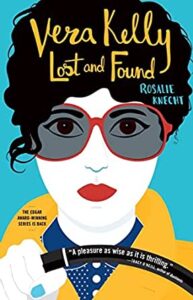
Rosalie Knecht, Vera Kelly Lost and Found
(Tin House, June 21)
Vera Kelly is back! If you’re not reading her rolicking adventures from spy-hood to PI-dom, you absolutely should. In this third installment, which takes place in the spring of 1971, Vera and her girlfriend Max head to Los Angeles to visit Max’s estranged family, now in ruins. Max’s parents are divorcing, her father is engaged to a younger woman and is being influenced by “an occultist charlatan” (via the book description but I love this phrase), her mother has up and left, and soon, Max herself winds up missing. And Vera is the only one who can find her. –Olivia Rutligliano, CrimeReads Associate Editor
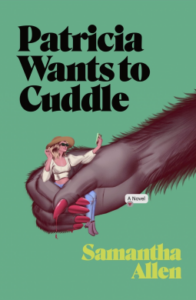
Samantha Allan, Patricia Wants to Cuddle
(Zando, June 28)
This is the lesbian Sasquatch novel you’ve always wanted. A group of finalists for a Bachelor-style show head to a remote British Columbian island to film the final episodes of the contest. While there, they encounter a female Bigfoot and her coterie of admirers, and those that do not admire her (as they properly should) are torn limb from limb because this is the most badass book imaginable. Patricia is the Sasquatch, by the way. The publisher describes it as “viciously funny” but I thought it was also kinda sweet. I’d give Patricia a cuddle.

Ann McMan, Dead Letters from Paradise
(Bywater Books, June 28)
Ann McMan is queer fiction royalty—she’s won the Lambda Award twice, and published 12 books along with other collections. In her new novel, hopefully the start of a series, we encounter the postmistress of Salem as she attempts to send dead letters to their final destinations and in the process begins to investigate a series of bizarre crimes.

Davey Davis, X
(Catapult, June 28)
In Davey Davis’ dystopian erotic thriller, the sadistic protagonist searches through underground raves, sex dungeons, and queer nightlife for a mysterious figure named X, in between having a ton of very kinky sex with a bunch of other characters.

Ashton Noone, Vicious Creatures
(Scarlet, July 19)
Vicious Creatures is bound to be one of the best debuts of the year. In this moody, atmospheric thriller, a woman returns to her hometown, hoping her ex-husband’s fear of the dark creatures that live in the woods surrounding will protect her and her daughter from his wrath. There, she reconnects with her best friend from high school, and the two grow closer to acknowledging their intense attraction to each other. Rural noir meets folk horror with queer characters? Sign me up!

Sarah Gailey, Just Like Home
(Tor, July 19)
Sarah Gailey’s newest difficult-to-categorize novel attempts to answer an impossible question: how do you stop loving someone who’s done irreparable harm to others, but always treated you well? The narrator of Just Like Home has returned to her infamous house to care for her dying mother, and to remember her serial killer father. Perfect for those who enjoyed Megan Collins’ The Family Plot or Jennifer Hillier’s Jar of Hearts.

Other Terrors: An Inclusive Anthology, edited by Vince A. Liaguno and Rena Mason
(William Morrow, July 19)
An essential new addition to the reading list of any horror lover or queer fiction aficionado, Other Terrors features some of the finest minds in writing with their takes on embracing “the other” within. Horror fiction has oft been a place where difference = fear, whether that’s fatphobia in Stephen King, transphobia in Silence of the Lambs, or xenophobia in the works of H. P. Lovecraft, and it’s refreshing to read a collection focused on inclusivity, not cheap, offensive thrills.

Natasha Pulley, The Half-Life of Valerie K
(Bloomsbury, July 26)
Natsha Pulley heads to the gulags, then to an atomic village, in her latest to combine fast-paced action and imaginative settings with beautifully developed queer relationships. When it comes to understanding the effects of radiation on the human body, Valery K is the best, so it’s shocking but not too shocking when he’s released from the gulag under one condition: he goes to work for his old college mentor, herself in charge of mysterious experiments in a Siberian village where everything, including the local residents, appears to be irradiated.

Hayley Scrivenor, Dirt Creek
(Flatiron, August 2)
Hayley Scrivenor’s Dirt Creek is as powerful as it is bleak, and that’s no small feat for the Aussie debut novelist. When a 12-year-old girl disappears from a small town, those around her immediately become suspect. The detective on the case, a gay woman who finds the rural setting stifling, is doing her best to track down the missing girl, but secrets kept by family and friends keep getting in the way. Particularly well-realized are the girl’s friends, Lewis and Ronnie – Ronnie wants to find her friend, and Lewis knows something about it, but the town’s homophobia and his secret friendship with a popular kid prevent him from telling what he’s seen.
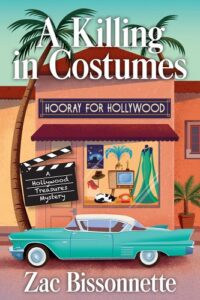
Zac Bissonnette, A Killing In Costumes
(Crooked Lane, August 9)
The only non-culinary cozy on this list, Bissonnette’s cozy first-in-a-series features two fading soap opera stars who find themselves with a new lease on life when they come into possession of a vast collection of antique costumes (that is, if they can beat the other buyers at a costume auction).
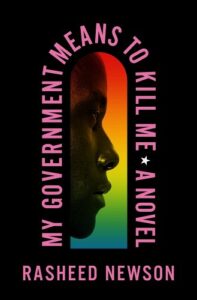
Rasheed Newson, My Government Means to Kill Me
(Flatiron, August 23)
You don’t want to miss My Government Means to Kill Me, the debut novel from Rasheed Newson, producer and writer of such acclaimed series as Bel-Air, The Chi, and Narcos. His novel is a powerful story about Trey, a young, gay, Black man in 1980s New York City as he comes of age personally and politically. Newson’s writing is crisp and clear, witty and engrossing—the kind of prose that pulls you in so quickly you’ll miss your subway stop (and I did). Do you like footnotes? If so, then this is the book for you: extremely thoughtful and clever on narrative, thematic, and formal levels, unfolding meaning in every possible place, My Government Means to Kill Me is a tour-de-force. –OR

Kelly J. Ford, Real Bad Things
(Thomas & Mercer, September 1)
20 years before, Jane confessed to murdering her stepfather in front of her entire small town; without a body, however, her words remained just words, and she found herself free of prison. Now, the bones of her hated relation have been finally discovered, but the problem is, no matter how much Jane insists that she and she alone was responsible for the man’s death, the townspeople can’t help but cast aspersions on her brother, her ex-girlfriend, and even her neglectful mother. Beautifully written and socially astute, Real Bad Things delivers on the promise of Ford’s 2018 debut, Cottonmouths.
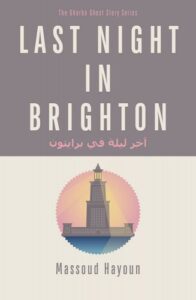
Massoud Hayoun, Last Night in Brighton
(Darf Publications, October 4)
While this one isn’t exactly a crime novel, it does mostly take place at night, and what is CrimeReads, after all, but Lit Hub After Dark? In Last Night in Brighton, a man wanders the shadowy underworld of Brighton Beach at night, thinks about ex-lovers, and has a series of strange encounters. Moody, atmospheric, and infused with noir feeling.

